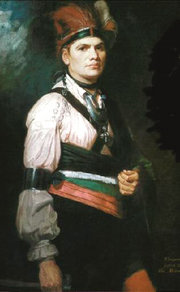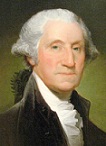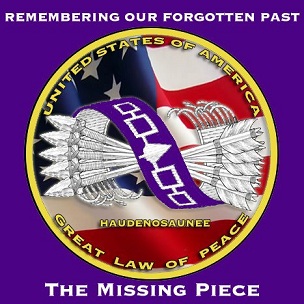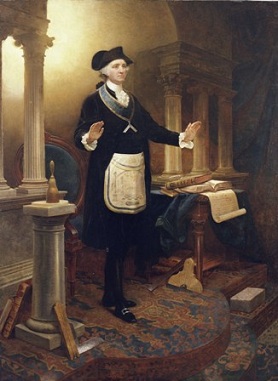I came across a high encomium to George Washington in a place I least expected it, the classic work by the anthropologist Lewis Henry Morgan. Morgan for many years lived among the Iroquois, studied their League or confederacy, learned their customs, and -- with his Seneca confidant Ely Parker, produced a work of outstanding depth and breadth that later scholars acknowledge as the veritable Bible on the Ho-de-no-sau-nee, (literally, people of the long house) or Iroquois.
Let me backtrack a bit. The early positive relations between the Native peoples and the newly arriving Englishmen gave way to suspicion and mistrust, finally hostilities. During the American Revolution there were a range of "Indian" nations which allied themselves with the British and against the Americans, whom they associated with the brutality and coarseness of the encroaching westerners -- so disrespectful, often dishonest, even cruel in their relations with the original peoples.
When the British lost, it would be understandable for even greater mistrust and animosity to exist between Americans and their late foes, native nations allied with the cause of King George III. But there was a surprise in store for the Iroquois, the Cherokee, and others. The surprise was the character, the magnanimity of the military leader of the Americans -- George Washington. Here, in their estimation, was a white man who behaved quite unlike white men.
From the Iroquois point of view, here was a man in the true sense of the word, stalwart in battle and then, in victory, expansive and generous. Morgan's scholarship into the religious lore and superstitions of the Iroquois uncovered this detail regarding Washington. Whereas the Iroquois did not have the stereotyped conception of a "happy hunting ground" they were essentially monotheistic, conceiving of a Great Spirit who as a tribal deity of the Indian people. The idea of a heaven was seen as peculiar to themselves. Writing in 1851, Lewis Henry Morgan explains:
"No white man ever reached the Indian heaven. Not having been created by the Great Spirit, no provision was made for him in their scheme of theology. He was excluded both from heaven and from the place of punishment. But an exception was made in favor of Washington. Because of his justice and benevolence to the Indian, he stood pre-eminent above all other white men. When, by the peace of 1783, the Indians were abandoned by their English allies, and left to make their own terms with the American government, the Iroquois were more exposed to severe measures than the other tribes of their alliance.
At this critical moment, Washington interfered in their behalf, as the protector of Indian rights, and the advocate of a policy towards them of the most enlightened justice and humanity.
After his death, he was mourned by the Iroquois as a benefactor of their race, and his memory was cherished with reverence and affection. A belief spread among them, that the Great Spirit had received him into a celestial residence upon the plains of heaven, the only white man whose noble deeds entitled him to this heavenly favor.
Just by the entrance of heaven is a walled enclosure, the ample grounds within which are laid out with avenues and shaded walks. Within is a spacious mansion, constructed in the fashion of a fort. Every object in nature which could please a cultivated taste had been gathered in this blooming Eden, to render it a delightful dwelling-place for the immortal Washington.
The faithful Indian, as he enters heaven, passes this enclosure. He sees and recognizes the illustrious inmate, as he walks to and fro in quiet meditation. But no word ever passes his lips. Dressed in his uniform, and in a state of perfect felicity, he is destined to remain through eternity in the solitary enjoyment of the celestial residence prepared for him by the Great Spirit.
Surely the piety and the gratitude of the Iroquois have, jointly, reared a monument to Washington above the skies, which is more expressive in its praise than the proudest recitals on the obelisk, and more imperishable in its duration than the syenite which holds up the record to the gaze of centuries
Thus George Washington, the only one white man among thousands, came to be revered by the Iroquois. He who had made his early fame as a soldier, fighting in the French and Indian was, known as ferocious in determination, labelled by the Iroqois the not-so-flattering epithet "Conotocarius" or (Ha-no-da-ga-nears), which signifies Town Destroyer (or Town Taker, Burner of Towns, or Devourer of Villages) -- now was memorialized as a man of peace. He who had been their worst enemy, now was honored as their truest friend.
George Washington, the Town Destroyer, by his character, by his noble deeds, revealed himself to be a white man with the good-heartedness and the integrity that whites were rarely known for.






